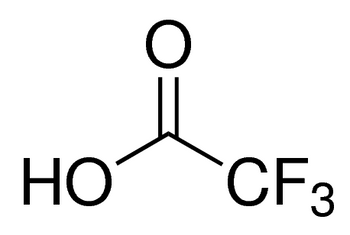Description
Trifluoroacetic acid for synthesis, 1L
for synthesis
Synonym(s):
TFA
Linear Formula:
CF3COOH
CAS Number:
76-05-1
Molecular Weight:
114.02
Beilstein:
742035
MDL number:
MFCD00004169
EC Index Number:
200-929-3
PROPERTIES
vapor density
3.9 (vs air)
Quality Level
200
vapor pressure
97.5 mmHg ( 20 °C)
Assay
≥99% (acidimetric)
form
liquid
refractive index
n20/D 1.3 (lit.)
pH
1 (10 g/L in H2O)
bp
72.4 °C (lit.)
mp
−15.4 °C (lit.)
solubility
soluble 10 g/mL
density
1.489 g/mL at 20 °C (lit.)
storage temp.
2-30°C
SMILES string
OC(C(F)(F)F)=O
InChI
1S/C2HF3O2/c3-2(4,5)1(6)7/h(H,6,7)
InChI key
DTQVDTLACAAQTR-UHFFFAOYSA-N
DESCRIPTION
General description
Trifluoroacetic acid is widely used in organic synthesis as a solvent, catalyst and reagent. It is a strong acid and low boiling point reagent. It can be used as a catalyst for a variety of reactions such as rearrangements, functional group deprotections, oxidations, reductions, condensations, hydroarylations and trifluoromethylations.[1]
Application
Trifluoroacetic acid can be used as a catalyst
- In the direct conversion of cyclohexanone to caprolactam using acetonitrile as the additive.
- In the synthesis of 1,2,4,5-tetrasubstituted imidazoles by four-component condensation of benzil, aldehydes, amines, and ammonium acetate.
- In the synthesis of d-α-Tterpineo from d-limonene by Markovnikov addition followed by hydrolysis.
Packaging
1 l in Glass bottle
25 , 500 ml in Glass bottle
2.5 l
100 ml
25 kg in Barrel PE/met
Features and Benefits
Trifluoroacetic acid can be used as a catalyst due to its
- High acidity
- Easy elimination
- Good solubility in organic solvent and in water.
Analysis Note
Assay (acidimetric): ≥ 99.0 %
Density (d 20 °C/ 4 °C): 1.487 - 1.490
Identity (IR): passes test
Density (d 20 °C/ 4 °C): 1.487 - 1.490
Identity (IR): passes test
SAFETY INFORMATION
Signal Word
Danger
Hazard Statements
H314 - H332 - H412
Precautionary Statements
P261 - P273 - P280 - P303 + P361 + P353 - P304 + P340 + P310 - P305 + P351 + P338
Hazard Classifications
Acute Tox. 4 Inhalation - Aquatic Chronic 3 - Eye Dam. 1 - Skin Corr. 1A
Storage Class Code
8A - Combustible, corrosive hazardous materials
WGK
WGK 2
Flash Point(F)
212.0 °F - Pensky-Martens closed cup
Flash Point(C)
> 100 °C - Pensky-Martens closed cup





